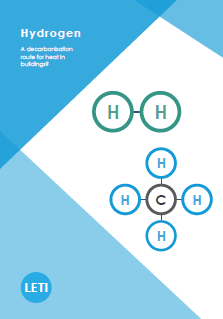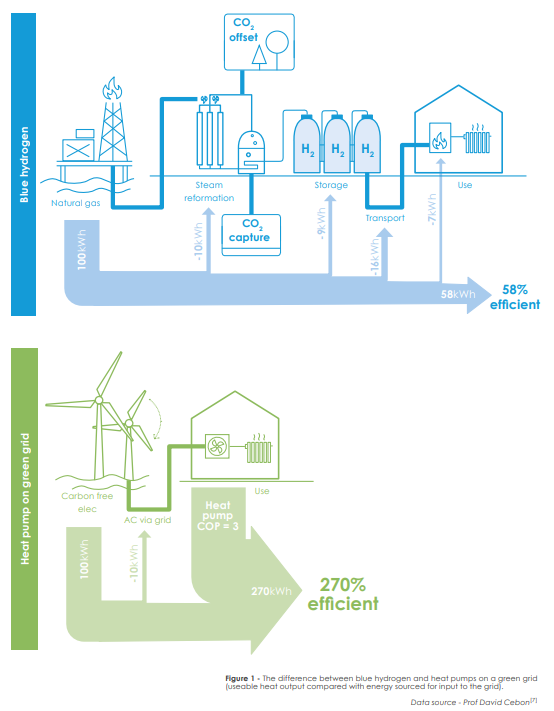Decarbonising Heat in Buildings
The EUA has just published, 21 April 2021, its thoughts on "Decarbonising Heat in Buildings" and records its "findings" that "While heat pumps are an important component of this mix, our analysis shows that it is likely to be impractical to heat many GB homes with heat pumps only".
However, the EUA analysis is based on the false premise that "Buildings need to be thermally efficient in order for heat pumps to be a viable heating technology".
It is true that any building will cost less to heat if it is thermally efficient – whatever heating system is used. Installing loft insulation and reducing draughts will reduce the cost of any kind of heating.
However, a heat pump can be used to heat a building of almost any era up to comfortable temperatures. An older building may require the use of a modern high temperature heat pump, if it is poorly insulated. Because plumbers have often oversized radiators when installing with gas heating it will often not be necessary to provide additional radiators, or underfloor heating, when installing a heat pump in place of a gas boiler. It may be sufficient to adjust the time clock so that heating starts an hour earlier in the morning.
The EUA suggests that a heat pump is not suitable if a house does not have a hot water cylinder. However, a hot water cylinder can be added if there is no existing cylinder in the house, or phase change storage if space is at a premium.
The EUA also suggests that installation of heat pumps would be difficult because of "the cost and disruption associated with the requirement to significantly upgrade the electricity distribution networks to cope with large numbers of heat pumps operating at peak demand times". It is clear that the electricity distribution networks will need to be upgraded anyway in order to cope with electric cars and other new demands for electricity.
Heat pumps can also benefit from "time-of-use tariffs". These encourage heat pump owners (and electric car owners) to use electricity outside peak hours and reduce the peak strain on the grid.
The viability of repurposing the gas grid to distribute hydrogen
For a more objective view of the merits of using heat pumps, or burning hydrogen, to achieve low carbon heating, you may want to hear the views of LETI on the viability of repurposing the gas grid to distribute hydrogen gas and whether this makes sense:

LETI, the London Energy Transformation Initiative, has investigated whether repurposing the gas grid to distribute hydrogen gas for heating makes sense.
Hydrogen fuel is often touted as a viable solution to assist in meeting UK net zero carbon targets. LETI has therefore sought to investigate this further and to examine to what extent hydrogen is likely to be used, either in part or in full, to accompany decarbonisation of the electricity grid.
LETI has just published its report on Hydrogen – a decarbonisation route for heat in buildings?
The report is available from LETI's website.
The brief report is recommended reading. It is well argued with clear illustrations and explains why LETI is sceptical about the practicality, efficiency and economics of burning hydrogen to heat buildings.
For those short on time, you may want to jump to LETI's conclusions:
- "We have found that the public discourse on hydrogen appears severely unbalanced, with the gas supply industry in particular over-selling "green-gas" to policy makers in order to protect their interests".
- "When blue hydrogen, supplied via the gas network, is compared to the use of heat pumps there is a stark difference in efficiencies".
- "It is unlikely that zero carbon hydrogen supplied via a re-purposed gas mains network will be available for the vast majority of buildings, for the foreseeable future".
The diagram below contrasts the limited efficiency of converting natural gas to hydrogen and distributing it through the gas grid (at 58%), with using green electricity to heat homes via air source heat pumps (at 270%).

It is worth noting that this route will still not yield a zero carbon system – unlike the heat pump route which is 100% zero carbon (and 100% zero NOx).
A well designed ground source heat pump system will yield a significantly higher efficiency than the air source system illustrated here.
Actions needed to achieve Net-Zero
We recognise that the progress to Net-Zero has been very slow. The Government has voiced many aspirations of addressing the climate emergency but has so far not taken the actions needed to launch the UK onto the right route.
The GSHPA is ready to work with the Government to achieve its objectives. The first step for the Chancellor is to reduce the taxes on electricity which are currently inhibiting the installation of heat pumps.
He should also consider taxing the burning of gas, oil and coal for heating which is the root cause of the climate emergency.
Government should also provide funding to make installing low carbon heating as attractive for the consumer as it is essential for the health of the planet.
The GSHPA is ready to help.

